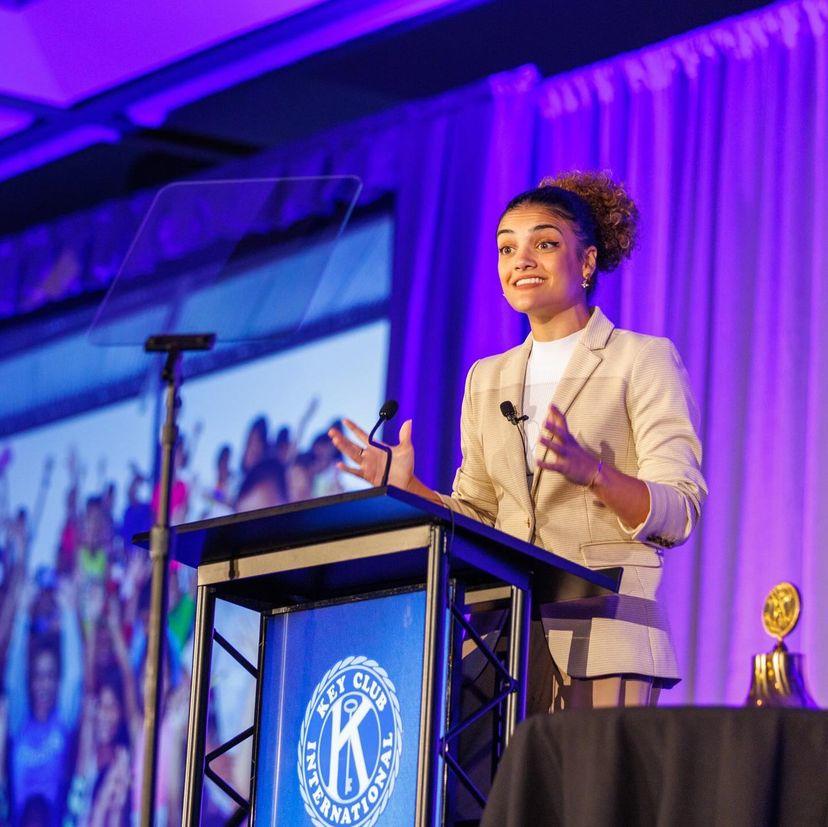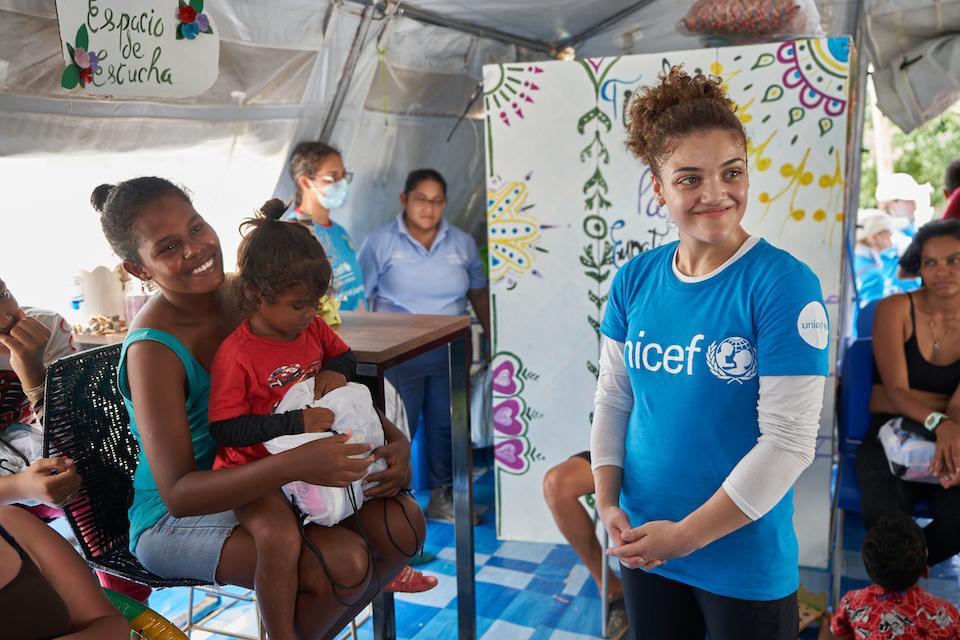
Caption
Laurie Hernandez pictured speaking at the Key Club International Convention in Atlanta on July 10, 2024.
Credit: Courtesy of Key Club International
LISTEN: Former Olympic gymnast Laurie Hernandez talks with GPB's Ambria Burton about her recent visit to Atlanta for a keynote speech for UNICEF, her new role at the Paris 2024 Olympics as a retired gymnast, and what advice she gives to younger athletes.

Laurie Hernandez pictured speaking at the Key Club International Convention in Atlanta on July 10, 2024.
Former Olympic gymnast Laurie Hernandez visited Atlanta on July 10 as a featured keynote speaker for the Key Club International Convention.
At the convention, she discussed her experience as a UNICEF USA Ambassador and an athlete and encouraged over 500 students in attendance to become leaders in their communities.
In addition to working with UNICEF, Hernandez will be a gymnastics commentator for NBC's coverage of the 2024 Paris Olympics.
GPB's Ambria Burton talked to Hernandez ahead of the convention about her Georgia connections, work with UNICEF, and what she looks forward to ahead of the Olympics.
Ambria Burton: You've been to Georgia a few times. Is there any Georgia connections you have here?
Laurie Hernandez: Oh, I think the main one is I have an old teammate and friend who used to compete for UCLA gymnastics and now currently lives in Atlanta. So, you know, if there's time, I’m hoping to say hello, I do have some friends out that way, especially in the gymnastics community. It’s pretty big out there in Georgia, so, yeah, that's I think that's probably my biggest connection there.
Ambria Burton: Is there anything you look forward to when you come to Georgia?
Laurie Hernandez: Oh, food. Definitely has to be the food. I'm hoping to try something new every single time.
Ambria Burton: [I know the keynote speech of you speaking in Atlanta] is a part of you being a UNICEF USA ambassador. What has been your experience doing that?
Laurie Hernandez: It's been so wonderful to connect with UNICEF and a huge honor to be a UNICEF USA ambassador. I mean, I've said this a few times in different interviews, but I grew up with a mom who was in social work, and I think having that lingo and having that connection to mental health and checking in with community and connecting with others is just something that I have kind of been raised to pay attention to. So, when I had the opportunity to be an ambassador, it just — it was the biggest game changer for me because I get to now use this platform but — again, from gymnastics and raise UNICEF in the process.

UNICEF Ambassador Laurie Hernandez visits a safe space for those who have experienced trauma while migrating through the Darién Gap. In this space, UNICEF provides psychosocial resources and support.
Ambria Burton: And what have been some things you've been able to do with UNICEF so far?
Laurie Hernandez: Yeah, I mean, I've been able to do a handful of things, but the biggest one is just traveling with them to Panama. We visited the Darién Gap, and it was just checking in and seeing what UNICEF is doing on the ground there. Between clean water and providing psychosocial support for women and children, you know, they're making a big difference for the families who are on the move and coming through the Darién Gap. It's one thing to hear about that and it's another to see it firsthand. So, it's again, a huge honor to be their USA ambassador, and to just raise up their voice and let people know this is the work that they're doing, and its important work.
Ambria Burton: That's amazing. And then I know with UNICEF, you are a keynote speaker at the Key Club Convention, as I mentioned. What are you looking forward to discussing at the convention today?
Laurie Hernandez: Yeah, I mean, one of my favorite things about keynotes is checking what the demographic is and being able to tailor whatever content it is to them. And it seems like there's going to be a lot of young — young listeners out there, today. So being able to share my story, whether that's through being a UNICEF ambassador, especially as an athlete, an Olympian, I just really enjoy connecting with them and telling them the stories of — of perseverance and courage. And yes, I'm retired at [a] really young age from sports, but at the same time it's sharing the common ground of sports and, again, ofcourage and what it means to keep moving forwards in the face of adversity. And I think a lot of people can connect with that.
Ambria Burton: Yes. And I know, like, this year you are corresponding for the Olympics. How are you feeling ahead of the Olympics this year?
Laurie Hernandez: Oh, I got a lot of butterflies, you know? It's the first Olympic Games that I have not trained for, but I'll still be going in as a commentator and with broadcast. So it's definitely a change of pace. Last Tokyo, I was able to do a little bit of commentary work or, rather, broadcast work and just talk about gymnastics and share my knowledge in the sport. So, I'm really glad that I get to stay connected with the gymnastics community and, you know, hopefully get to share everything that I've learned and translate what people are seeing on screen into everyone's TVs at home.
Ambria Burton: ... As a retired athlete, what's that experience like with corresponding on a sport that you once competed in?
Laurie Hernandez: I think it definitely gives me a lot of — well, I know obviously a lot of familiarity with it, but there's also a lot of empathy in having competed within the last, you know, two or three [qualifications] and whatnot of the Olympics. I just get to share those experiences. And I also feel like I'm really connected and up to date with the gymnastics code of points. So again, sharing what I know is definitely something that will come a little bit easier having competed under this set of rules and regulations that tend to change every four years — you know, of course, to make it harder, as if it isn't hard enough already.
Ambria Burton: Right.
Laurie Hernandez: But yeah, that's the biggest thing. Again, just lots of joy and gratitude in being able to be out there, especially with Golf Channel's Rich Lerner. That's — that's a huge honor to be able to co-commentate with him.
Ambria Burton: ... Taking your experience with gymnastics with the press and, like, the public, how do you use that experience with your experience with UNICEF now?
Laurie Hernandez: The biggest thing is just having a platform. Part of being able to go into commentary and broadcast is knowing that — that I had competed in gymnastics and trained internationally, competed for the United States, and now because of that platform, I get to go in and say "Hey, you know what? I know a lot about this." And I'm again grateful for the opportunity to be out there. It feels like a similar connection to UNICEF, where because of training and because of being a professional athlete, I now have this platform on social media and get to talk about all the great things UNICEF is doing and just share how much I think it's important and that we spread that word.
Ambria Burton: What’s always a piece of advice you give younger athletes who have hopes of making the Olympics and gaining platforms like [yours] one day.
Laurie Hernandez: Giving advice: Whether it's to gymnast — to gymnasts or to kids and young adults in different sports, the biggest thing I'd say is just to trust your intuition and know that sometimes it does get really difficult, and there's going to be those moments where you want to quit and step back. I know I quit during an Olympic year, which not many know about. It was only for about three days. I really thought I did something there, but I quit because I just — I needed a break. And it turns out my body and my brain were asking for it. And I think because I was able to listen to that, I think that's why everything worked out — for everyone. Trust your intuition. Trust your gut. Listen to your mind and body and know that you can do hard things.
Ambria Burton: I love that. Was there anything else that you wanted to add about UNICEF or, like, the Olympics or anything?
Laurie Hernandez: Oh, I think we covered everything, especially with the Olympics. And it is exciting that we get a — almost repeat team of the athletes that are going to be out there in Paris who were out there in Tokyo. I think because of it being a "COVID Games," that definitely made things difficult and there was a big energy shift, not just for gymnastics but for all sports. So, we're going to see a lot of really incredible athletes out there this summer, especially because now we've got new audiences.
Ambria Burton: One more question with UNICEF: What is something you guys are looking forward to in the future or planning ahead?
Laurie Hernandez: Planning ahead: I mean, it all just depends on the scheduling and whatnot. But I think a big dream for me personally would be to go on another trip with them and keep checking in with what they're doing on the ground. Because again, we hear so much about it, whether it's through media or through news articles, through Zoom calls for me. So getting to check in and be on site, on location and see again firsthand what they're doing. Because being able to go to Panama and go to the Darién Gap and check in with the kids — I got to read to some of the kids that were coming in, and even though there was a language barrier, it was like there was still that connection of humanity and joy and gratitude and especially, again, kids are so determined. They have a lot more courage than we give them credit for. So again, going to another trip and seeing that I think would mean a lot to me.
The 2024 Paris Olympics will begin on Friday, July 26 to Sunday, Aug. 11.